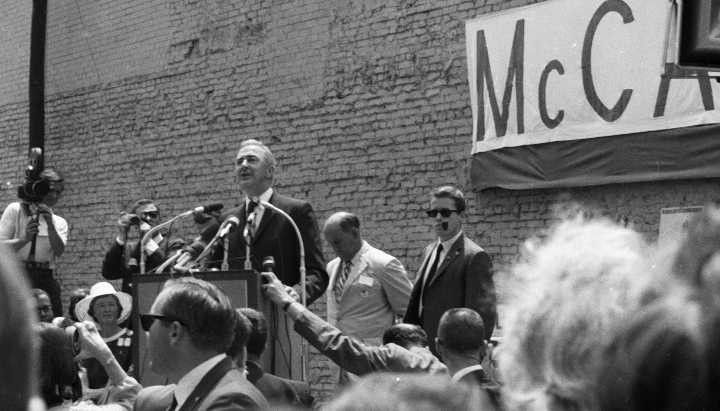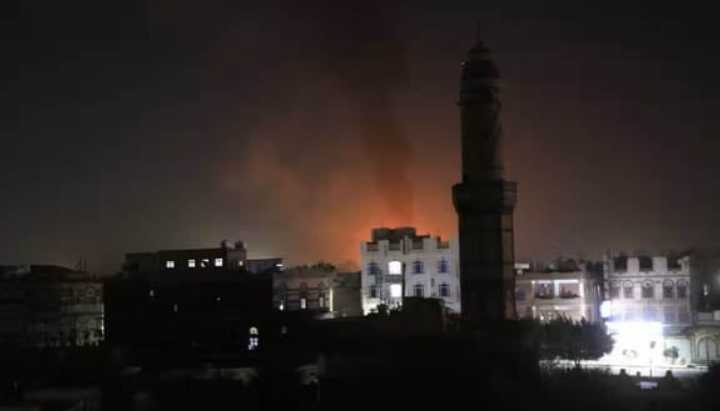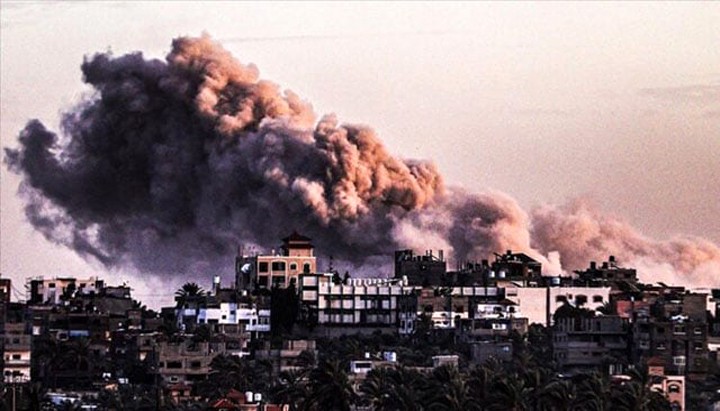Last weekend the New York Times published
a report that President Biden has been missing in action in recent
months when it comes to serious question-and-answer sessions with the
Washington press corps. The obvious reason for the lack of press conferences
is “to protect” the president from unscripted exchanges that often result in
missteps and confusion. Had I been writing the piece, I might have added that the
president is intent on not blurting out an unwanted truth. And he is not
alone in avoiding the press. The fact is that Secretary of State Tony Blinken
and National Security Adviser Jake Sullivan have similarly disappeared in
recent months when it comes to give-and-take sessions with the White House
press corps. In their place we now have John Kirby, a retired admiral
who is a nice enough guy. He was a press guru at the Pentagon a decade or so
ago when I was writing lots of tough stuff on national security issues,
usually with no named sources, for the New Yorker. He made no
pretenses then about being a policy maker, and he is no different now. Yet it
was Kirby who was left to take a battering from a miffed press corps press
earlier this month when the administration released a blame-anybody-but-us
policy paper—distributed on just a few moments notice—dealing with the flawed
US withdrawal from Afghanistan. The senior officials who should have been explaining that
policy were Blinken and Sullivan—and perhaps even the president. In my view,
his decision to pull the American military out was a high point of his
diplomacy since taking office. It was bad luck that a terrorist bomb killed
thirteen US soldiers and at least sixty Afghans, eviscerating all that was
good in America’s change of policy. Yes, mistakes were made—the rush to get
American troops out of harm’s way led to the disastrous early shutting of the
vital Bagram airbase—but Biden did what he is being paid to do: he made a
tough decision. He has yet to do so about Ukraine, or China, or the recent
perhaps game-changing developments in Israel. And he has not addressed the
fact that under his administration signs have emerged that America may
no longer be the dominant global power in foreign policy, international
trade, and general esteem. At some point, if Biden wants to be re-elected, he
will have to face a press corps that will ask the questions about
subjects—such as his current low standing in the polls—that now seem to be
taboo. All of which brings me to tell you what I know about going
with the second string in dealing with the media. I was definitely below the
cut line during my five months as press secretary and sometime speech writer
for Senator Eugene McCarthy, a liberal Democrat from Minnesota who decided in
late 1967 to challenge fellow Democrat Lyndon Johnson for the presidential
nomination the next year. McCarthy had spent a decade in the House before
winning a Senate seat in 1958, and was far from a flame thrower when it came
to the Vietnam War. Nonetheless, he decided to do what Senator Robert
Kennedy, the all but inevitable heir to the throne, chose not to do in late
1967: take on an unpopular sitting president. I was not a political junkie and knew nothing about
McCarthy, a two-term senator whose contempt for the war turned out, to my
surprise, to be extreme. But I did know that the antiwar Democrats were
desperate to find someone credible to challenge Johnson and get him out of
office. Not likely, so I thought. In mid-December a neighbor of mine named
Mary McGrory, then the must-read columnist of the Washington Star,
a long gone daily, came over for a martini, which she often did, and told me
I needed to be McCarthy’s press secretary. Mary was a fixture in Washington’s
Irish mafia and since she had given up on Bobby making the run she decided it
was up to Gene to do it. The ambivalent McCarthy, she said, was willing to
take a flyer, but he needed help, lots of it. And I needed to be his press
secretary and write his speeches. I hated politics and all the compromising involved, but I
had resigned from the Associated Press’s Washington bureau earlier that
summer and just finished a book—any money coming from it was months away—and
I was anxious about being just another freelance, and thus broke, Washington
journalist. So it was arranged—the next day, if I recall it right—for me to
sit down with the senator and see if it could work. I had gotten to know
three or four senators since I hit Washington two years earlier, and I liked
their quickness and willingness to work. At his office, I got the
immediate sense that the Minnesotans working there were hostile to the notion
of a separate campaign office that would include none of them. McCarthy
himself was a handsome man who’d been a varsity athlete in college and looked
fit. He was totally diffident toward me, just as he was about the idea of
challenging a fellow Democrat who happened to be in the White House. I gave
him a sheaf of magazine stuff I’d written—slim pickings to be sure—and he
glanced at the pieces, looked over the young punk in front of him, and said,
“I guess you’ll do.” I don't think our meet and greet took more than ten
minutes. I called McGrory up and told her she’d thrown me to the
wolves. Stick it out, she said. Gene was giving a speech the next night in
New York City to an anti-Johnson Democrat group. She said it could lead to
some serious campaign money, and I should go listen. I did, and I heard the
senator, who I thought had been disdainful of the antiwar movement, give a
forceful and compelling denouncement of the Vietnam War as immoral and take a
step further by accusing Johnson of violating his oath of office. I’d been
obsessed about the war for years—it wasn’t an accident that I would pursue a
tip two years later and find the story of the My Lai massacre—and I had never
heard a national politician describe Vietnam as the moral horror it clearly
was, let alone suggest that Johnson was denigrating his office. And so I decided to give it a shot. A McCarthy campaign
press office had been set up in downtown Washington and I was suddenly in
charge of it. The young anti-war woman running it seemed terrific, and she
became my deputy. I needed one quickly because the senator and I were to fly
to Los Angeles the next day, and I was going to be his batman for the trip. I
spent the rest of the day and much of the night going through my collection
of antiwar tomes by authors such as Bernard Fall, then the leading expert on
Vietnam and the war, and various publications by church groups that had been
tracking the murderous war since the first American troops arrived. I put
together a collection of 40 pages of homework and gave it to McCarthy. He brought his poetry to read on the trip—he was
passionate about it—and wasn’t interested in his first class seatmate. But
one of the articles was about the trial of five antiwar activists, including
Dr Benjamin Spock, America’s favorite pediatrician, accused of aiding and
abetting draft dodgers. McCarthy, who had four children, was interested. When
we hit Los Angeles, the senator did a fund raiser or two with the Hollywood
crowd, but the big event for him was a long-scheduled speech at an
end-the-war rally at UCLA. It was a big audience—maybe seven or eight
thousand in all—and during the Q&A session he was asked about the Spock
trial. I learned about the genius of the senator as I listened to him put
what he had casually read on the plane into a strident and accurate defense
of what Spock and his colleagues had done. He was with them, he said to a
roar of applause. Most important, as we learned the next morning, the
senator’s defense of Spock and his co-defendants made national news, and I
had helped him do so. It was the high point of my tour as a press
secretary. Not being house-trained in public relations, I broke every taboo
of the trade. A few days after returning from Los Angeles I got a
telephone call from the candidate’s wife, Abigail, who told me to minimize
any public emphasis on the family’s Catholicism, which she thought would be a
disadvantage in southern New Hampshire. I told her I worked for her husband
and not for her. I learned quickly that Gene was deeply religious and had
spent time in a seminary after college but had moved back to the secular
world after less than a year of seclusion. His faith was his own business,
and no one else’s, and to pretend he wasn’t a Catholic was loony. Big
mistake. I did not know about “pillow talk,” the political phrase for the
power of a candidate’s wife. I had made her a pillow talk enemy by my second
week on the job. I was later exposed to the power of pillow talk in 1981.
Ronald Reagan had won the presidency and I was two years into a long book on
Henry Kissinger. Reagan’s national security adviser was Richard Allen, an
arms control expert who worked for Kissinger in the early Nixon
Administration days and was unafraid to tell me things I needed to know.
Allen was most puckish and he and I sometimes exchanged stupid and smutty
jokes when he was in the White House. Reagan adored this sort of thing, Allen
told me, and one afternoon after I came up with a a good one over the phone,
Allen said, “The President would love this one,” and he asked me to hang on.
I listened as Allen then called the Secret Service agent on duty outside
Reagan’s office and asked, “Is she there?” She being First Lady Nancy Reagan.
The agent said yes and Dick told me he’d deliver my joke when she was not
around—not a good move. Allen would not last many more months as national
security adviser. But he did tell one story worth repeating. It was known
that Reagan did not want to be awakened even if the National Security Agency
came up with a hot intercept marked “Critic”—the designation meant the
message had to be on the president’s desk within minutes. One very early
morning Allen was informed that the Israeli air force had successfully
attacked and destroyed an Iraqi nuclear reactor outside Baghdad. This was
something that had to be shared with Reagan. He called the special telephone,
and the president answered, listened carefully to the message, and after a
long pause said, “Well, Dick, boys will be boys,” and went back to bed. (Dick
told the story in different ways over the years, but the punchline has
remained intact.) I thought my job was getting reporters to interview
McCarthy and generate publicity and perhaps a few more contributions to the
campaign, which needed money badly. Nope. McCarthy was not a fan of the
Washington press corps, especially because he was treated as an oddity by
reporters. I constantly urged and begged him to do more interviews, and
he—this was two months into the New Hampshire campaign—accused me of planting
reporters in the back seat and trunk of every car he was riding in. “The
reporters love you,” he said to me again and again, “but they’re supposed to
love me.” As McCarthy was gaining traction among moderate Republicans and the
working class in New Hampshire, Ward Just, a wonderful reporter for the Washington
Post (and later a prolific novelist), fresh from a long stint in
Vietnam, called me to say he wanted to come up to New Hampshire to see
firsthand how an avowedly anti-Vietnam War candidate was doing. I told the
senator about Ward’s plan and, to my surprise, he made a face and said, in
essence, No way. Why not? He gave me a sharp look and said, “Don’t you
remember what Ward wrote about me in Newsweek?’ I had to call
the Newsweek offices in Washington to find the quote: Ward
had written a small gossipy item six years earlier about McCarthy in a
section of the magazine called Periscope that was filled with little
oddities, and he depicted Gene as walking like a priest. The senator kept on
asking me for days if knew how a priest walked. Ward came, of course, and McCarthy
spent time with him, but he resented every minute of it. Most important in my demise were my constant attempts in
the speeches I occasionally drafted—the campaign had hired someone much more
gifted in the role—to get the candidate to include a call for a guaranteed
annual income of $12,000 for every American in need. My staff had been
pushing me to get the senator on board, but the operatives running the
campaign, most of whom were already measuring their White House offices,
thought the idea was political suicide. I finally got McCarthy to sign off on
the proposal, and it was included in a speech he was to give in early March,
when the polls were showing that President Johnson, who had hesitated about
running in New Hampshire and was a write-in candidate, was not going to win
big, if he won at all. By this late date—the primary was on March 12—McCarthy’s
surge was a great political story and my office was responsible
for chartering a commercial jet and billing the reporters on each leg as the
candidate gave speeches to constantly growing crowds. The job was getting
less and less fun for me, because with success came more reporters and more
demands for unwanted interviews, and less access to the man himself for me.
But the final draft of the speech included the call for a guaranteed annual
income and the press release I wrote for the forty or so journalists that
were following the campaign and traveling with us emphasized it. Some of the
old-timers asked me again and again whether the senator was really going to
do it. The speech was going to begin late and the reporters for morning
newspapers and the wires had to file early to make the first edition. I
assured them all that the commitment was in. But McCarthy dropped the commitment when he delivered the
speech. I was off stage and as the senator went by he asked me, “Whatcha
think?” I said D-minus. Wrong answer, as he and I knew. At the bar that
night, two or three of Gene’s old pals told me they had been upstairs in the
hotel having a drink with Gene and some of his wife’s money boys and I was
doomed. And so I was. I hung in past the primary, in which McCarthy came within
a few points of the president, who then announced that he would not run for
re-election. That would bring Bobby Kennedy into the race, and surely
undercut the McCarthy campaign. I had done the best I could, but I was never
inside the decision-making process of the campaign, just as John Kirby and
others in the press operation in the White House will never be, either. To pretend that President Biden is focused on trying to
reach the American people by different means, and not avoiding the
give-and-take of a news conference open to all, as a White House aide told
the New York Times, is just horseshit. - SEYMOUR HERSH |








